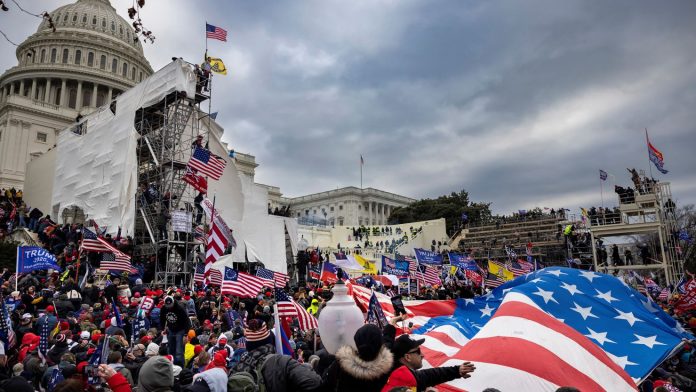The President-Elect Warned That Some Members of the House Committee That Investigated The Jan. 6 Attack “Should Go To Jail.”
A New York City man involved in the January 6 Capitol riot, Philip Sean Grillo, made headlines after taunting a federal judge with the claim that President-elect Donald Trump would pardon him. As Grillo was being handcuffed following his one-year prison sentence, he declared, “Trump’s gonna pardon me anyways.”
This statement reflects Trump’s strong stance on offering clemency to supporters who participated in the January 6 attack, which he described as enduring “hell” while imprisoned.
Trump’s Comments on Pardons and Justice
In a recent interview with Meet the Press moderator Kristen Welker, Trump expressed his plans to act swiftly upon taking office to provide relief to the January 6 defendants. He described their treatment as unjust, referring to it as a “very nasty system” and alleging that many were pressured into guilty pleas. Trump has said he will prioritize pardons starting on his first day, specifically for those who have been detained for extended periods in conditions he called “filthy” and “disgusting.”
Clarifying His Pardon Strategy
Trump did acknowledge potential exceptions, such as individuals who were deemed “radical” or “crazy.” Despite this, he suggested that the justice system had unfairly targeted many defendants, including those who admitted to offenses like assaulting police officers. He maintained that some of these individuals pleaded guilty because they felt they had “no choice,” highlighting the pressure they faced with potential harsh sentences.
The Broader Scope of the January 6 Investigation
Over 1,570 individuals have been charged for their roles in the Capitol attack, with 1,251 having been convicted or pleaded guilty. Of those, 645 have received prison sentences, varying from a few days to 22 years. Currently, approximately 250 people remain in custody, serving time or awaiting trial. The offenses range from minor infractions like unlawful parading to serious charges such as seditious conspiracy, with some defendants accused of violent acts, including assaults on officers and plotting attacks.
Trump’s Views on the DOJ and Prosecution
Trump also addressed questions about his potential actions as president regarding the Department of Justice. He said he would not direct his attorney general nominee, Pam Bondi, to investigate special counsel Jack Smith, who previously brought two federal cases against Trump. While Trump criticized Smith as “deranged” and “very corrupt,” he emphasized that decisions about prosecution would be left to Bondi’s discretion.
Judiciary’s Response to Trump’s Pardon Plans
Senior Judge Royce Lamberth of the DC District Court acknowledged the ongoing efforts of the judiciary in handling the Capitol riot cases. When asked about Trump’s potential pardons, Lamberth said he would carry out his duties impartially, regardless of political influence. He emphasized that delivering justice is paramount, regardless of political dynamics, ensuring that all actions are guided by the judicial oath.
Conclusion: Trump’s January 6 Strategy in Focus
Trump’s strong stance on pardoning January 6 rioters highlights a pivotal moment as he prepares for his presidency. While critics question the implications for the justice system, Trump’s continued rhetoric underscores a commitment to his supporters and challenges the legal norms surrounding presidential clemency.








